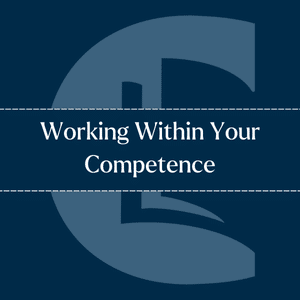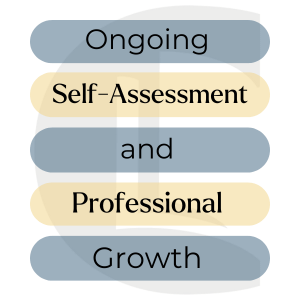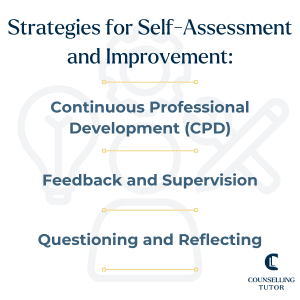Trauma Informed Practice Course
The Competence and Confidence to Work with Trauma in Your Practice.
The following article is taken from our Trauma-Informed Practice course.

The Competence and Confidence to Work with Trauma in Your Practice.
Maintaining professional competence is crucial to ensuring effective and ethical practice in counselling and psychotherapy. This article explores the concept of competence, the ethical obligations surrounding it, and strategies to self-assess and enhance your skills. It also highlights the dangers of overestimating your abilities and the importance of Continuous Professional Development, and working within your competence in counselling practice.
This comprehensive understanding and reflection on working within your competence is vital for all counselling professionals, ensuring you can provide effective and ethical support to your clients.

Working Within Your Competence in Counselling and Psychotherapy
By the end of this article, you will:

Ken Kelly: Speaking about working within your competence, and I think it all starts with what is competence.
Rory Lees-Oakes: Yes. That’s a very good question, Ken. I think competence is mastery of a skill or a process. If you are, cooking something and you’re using an oven and pans, you need to have a degree of competence to make sure that, if you’re using gas, you don’t blow yourself up and you don’t give people food poisoning, and that you have a degree of understanding of the processes that go into making the food.
Usually that’s done by having a recipe, someone looks at the recipe, and makes the cake to the recipe. Competence is about that recipe. If we move from baking cakes to counselling it’s about training.
Working with any competence is about being trained in a certain modality, or a certain client cohort. And unless we have that competence, we may find ourselves in some [00:01:00] difficulty. And the idea I had when I qualified was that, I’m qualified now, I can work with anything. I soon found out that it wasn’t the case, which is why I’ve spent the last 18 years after qualifying, doing one CPD course after another.
If you leave college with your brand new degree, master’s degree, or diploma, and you think you’re the finished article, you might be heading into stormy waters. That is why we have CPD, because there’s an acknowledgement that different client presentations, even different client groups, need to be understood.
We get training so we know we are doing it correctly.
Ken Kelly: Beautifully said Rory. Competence in counselling is defined as possessing sufficient knowledge, judgement, skill, or strength to perform a particular duty.
The National Counselling and Psychotherapy Society emphasises the importance of providing services only in the areas where practitioners are trained and competent, and can recognise their own limitations, and refer clients when necessary. So that is the NCPS based here in the UK. And of course, the BACP, British Association for Counselling and Psychotherapy, have a very similar statement within their ethical framework.
It is vitally important for the safety of you as a practitioner, and for the safety of your clients. If we’re working outside of our competence, we may be doing damage that we cannot see and that we don’t understand. We may be doing damage to our own practice, and putting ourselves in a difficult situation.
And I think this keys into something called the Dunning-Kruger effect. So you say Rory about this cake recipe? I fancy myself as a bit of a cake baker. I’ve never read a recipe, but I think to myself, in my mind I can see a beautiful chocolate cake, so I’m gonna pop into my kitchen and I think there’s some flour in there, and I’m gonna put some eggs in, a bit of butter, some cocoa powder. And I’ve got an oven, so I’ll pop that in the oven there. And when it comes out, if I eat that, it might taste okay. I might go, oh yeah, that’s okay.
It doesn’t mean it’s a good cake. I am being affected by Dunning-Kruger effect, which is a cognitive bias and it really leads us into what we don’t know, if something is unseen to us, then there’s no way I would’ve known to make that cake properly.
I would’ve had to have mixed it. I would’ve had to put in some bicarbonate of soda as a rising agent, I would’ve had to have selected the right temperature. So I may get out a cake that my family go, yeah, that’s actually quite nice that they might even be being kind to me. Or it might taste good on that occasion.
On that occasion, Dunning-Kruger effect. Acting outside of your competence, yet feeling it is okay, and it’s a bias that can affect any of us, Rory.
Rory Lees-Oakes: Absolutely. I remember in my early training being given a handout, I think it was either a paper or an article written by the late Pete Sanders.
He talked about Dunning-Kruger, but he didn’t use those terms.
He said when he’s trained, and been reflective, and being open to new ideas, he’s been successful. He said, but there was two occasions where I thought I knew best. One was he was tiling a roof and he fell off it, and the other was when he was in a motorboat and went backwards.
He thought he was going forwards and he went backwards. And Dunning-Kruger is a real thing. We’ve all come across people who say, oh, I can do that. I’m sure if you think about someone who’s said I can do that, and made a right mess of it, that is Dunning-Kruger Effect. And when we’re talking about working with trauma, we are working, as with everything in counselling, with people’s lives.
We don’t know what happens when someone exits the therapy room at the end of a session. Ken’s analogy about cake baking, the worst that could happen is someone might be sick. But if you are working outside of your competence with trauma, you don’t know what might happen. That is why it’s really important that, not just with trauma or any specialty, that you get some training.
Ken Kelly: Working outside of our competence can be dangerous. It can be, it’s not always. And there are times that you’ll get by, in the same way as I can make that chocolate cake and my family will say it’s very nice, but if I then start getting professional orders from hotels and coffee bars for cakes, I’m very soon gonna find that I’m very out of my competence because they’re gonna feedback and let me know the truth.
The impact of Dunning-Kruger is also compounded by what is referred to as the dual burden, and it’s the combination of overestimating your skills, and being unaware of this misjudgement, and the effect that can have on yourself and on another. And because this is a hidden thing, we see it often. It shows itself as tutors when Rory and I were teaching side by side, we’d often get a student that would say, I’m thinking of going into a placement, but I wanna work with children and young people. So I’m gonna take what I’ve learned here on my level four diploma course, and I’m gonna go into a placement working with children and young people.
And it sounds innocent, it comes from a place of wanting to help and care. Working with young people and children is a specialist area of training that somebody would do after they finished their core basic training. The same is true of trauma, the same is true of online working. And we saw this come to a very spiky point during the covid lockdown, where counsellors were unable to work except by going online. The ethical or professional bodies started issuing competencies that people need to have to work online. It’s easy to look at counselling and go, I’ll just do the same as I do face-to-face in the room with a client, but I’ll do it over the telephone.
And you may do a couple of those and they may go okay for you and the client, but there are hidden pitfalls that if you haven’t trained for them when they arise, it can be catastrophic for the client, and it can be for you. So the importance of recognising that it does exist, it can affect all of us, and the impacts of it are incredibly dangerous.
And I think we should move on to strategies of self-assessment, because if there is a blind area, are there any strategies that we can use for our own self-assessment?
Rory Lees-Oakes: Yes, if I were to be thinking about baking a cake and went to my friend, the chef. My friend, might say, how much do you know about baking cakes? I might say, seen it on TV. How difficult can it be? To which I imagine he’d have a few choice words for me.
But I think the first point is check out your own perceptions. One of the things that humans are really good at is fooling ourselves into thinking that we could do things we can’t. And I would, when I decided to work in the area of trauma, I went to my supervisor, I’m thinking of working in the area of trauma. And she said what training have you got? And I said I’m a qualified counsellor. I left equally informed and berated from that session, and rightly so, because she was a trauma specialist, she worked with young people who had very difficult backgrounds.
She understood that it was really important to have training in that area, and I went and had training. It was the same when I became a child therapist, I took training in the area because I realised, I needed a bit more than my initial training.
And I took a course very quickly. I think it was over the school holidays, so I started in June and took the training through the academic break. When I came back, I was a lot more competent. The key thing here is that my supervisor could supervise me with the new skill that I’ve got.
And I do hear, certainly when we talked, where supervisors were unsure of the modality that was being taught. That’s why when Ken and myself were tutors, we had supervisors for our students who understood the modality of therapy we were teaching.
Because, some people would come to us and say, I’m a CBT supervisor. And we’d say, do you do person centred? No, I’ve done CBT. That’s not a great fit for a student who’s learning. So the first port of call is speak with your supervisor and ask the question. And I think a good supervisor would say, do you think you should do some training, or how much do you already know? And the conversation can go on from there.
Ken Kelly: Yeah, and what came up for me there is the importance of having a supervisor that does hold the competencies and the training within the area that you are looking to work in. So what we don’t want is a blind leading the blind.
Online and telephone counselling, for example, if you look to the ethical guidelines, certainly of the BACP, certainly for ACTO, Association for Counselling and Therapy Online, the guidance is if you are working online or over the phone, your supervisor should also have trained in that way of working so that they are able to support you through it.
So that is that, support through your feedback from your supervision. You can get feedback from your peers as well. It is interesting you kicked this all off Rory, talking about graduating and not being the finished article and realising over your 20 years in therapy, that CPD is Continuing Professional Development. It doesn’t stop. It’s not like after 20 years you go, now I know this stuff.
And it’s interesting to watch your arc, Rory. As you have become more of a mature therapist, you have done more CPD, not less. Because we realise that improving our competencies is always a good thing, and in service of our clients.
So we’ve got CPD, feedback, and supervision. These are strategies for self assessment and development. The third one that I’d like to share is about questioning and reflecting. As counsellors as psychotherapists, when a session ends, we might have process around that.
We’ll do our professional notes, we can think about what was that, how did that go and look back, being a reflective practitioner is part of the training, we get to be reflective and reflexive.
Reflective being, looking back and thinking about how that went and how we felt that went. Asking our clients how it was for them. And then reflexive, looking at what we need to do if we recognise something that needs to be applied or something we need to learn.
Any final thoughts on working within your competence in counselling and psychotherapy, Rory?
Rory Lees-Oakes: Yeah, I just pick up on your comments, Ken, about a healthy dose of introspection. It was interesting when I did my trauma informed course. First question is, why are you studying to be a trauma informed practitioner? And there was a lot of shuffling of feet and looking in different directions.
As the group formed, it became clear that a lot of the people training had experienced trauma in their own life. Counsellors tend to gravitate towards the work that has informed their own experiences.
You have to make sure, you are okay. That you’re regulated. In trauma circles, they say that there’s two people in the room. One has to be regulated, and that’s you, the therapist. Because you can’t have two disconnected people. So that also speaks to personal therapy.
If there’s anything unresolved, that might trigger you when speaking to a client who’s experienced trauma, then I think one of the roads to take is your own therapy to make sure you are okay. Because what we can’t have is someone who’s a counsellor, counselling a client, client mentions an event, that event is something that the counsellor has experienced themselves or one like it, they become dysregulated, and that isn’t gonna end very well. Personal therapy, make sure you are okay to work with this very different, and demanding work because these are people in real crisis that you are working with.
So I think that mixture of personal therapy, supervision training, peer support, all goes into making what is a wonderful chocolate cake. And I’ll leave it there.
Competence in counselling is defined as possessing sufficient knowledge, judgement, skill, or strength to perform a particular duty. The National Counselling and Psychotherapy Society emphasises the importance of providing services only in areas where practitioners are trained and competent, can recognise limitations, and are prepared to refer clients when necessary.
Similarly, the British Association for Counselling and Psychotherapy (BACP) outlines the need to work within your competence, which includes continuously evaluating whether you have the necessary skills, knowledge, and judgement to offer competent care. This ethical responsibility underscores the need for ongoing self-assessment and professional growth.

A critical concept of competence is the Dunning-Kruger effect, a cognitive bias where individuals with limited knowledge or competence in a domain overestimate their abilities. This phenomenon can lead to practitioners making erroneous judgements without realising their incompetence, thus potentially harming clients.
The impact of the Dunning-Kruger effect is often compounded by what is referred to as the “dual burden”—the combination of overestimating your skills and being unaware of this misjudgement. This effect can result in counsellors and psychotherapists continuing to work outside of their competence, thinking they are capable when they are not.
To mitigate the risks associated with the Dunning-Kruger effect and ensure ongoing competence, several strategies are recommended:

An illustrative example is an American police officer who, while demonstrating gun safety to a class of children, unintentionally injured himself. The officer confidently declared, “I am the only person in this room professional enough to carry this Glock 40 (hand gun),” before accidentally shooting himself in the leg. This incident starkly demonstrates the disparity between perceived and actual competence. The officer’s overconfidence made him make a critical error, highlighting the dangers of assuming competence without sufficient self-awareness or skill assessment.
This case powerfully reminds us of the importance of humility and continuous learning in professional practice. It underscores that even those who appear highly competent can make mistakes and emphasises the need for ongoing self-assessment and openness to learning.
Working Within Your Competence in Counselling and Psychotherapy
This discussion has outlined the importance of working within your competence in counselling and psychotherapy. Practitioners must regularly evaluate their skills and knowledge, engage in continuous professional development, and seek feedback to ensure they provide their clients with the best possible care. The learning journey in trauma-informed practice and other areas is ongoing, with new insights and techniques emerging continuously.
BACP (2018). Ethical Framework for the Counselling Professions [Online]. Lutterworth: BACP. Available from: <https://www.bacp.co.uk/events-and-resources/ethics-and-standards/ethical-framework-for-the-counselling-professions/>
Darwin, C. (1871). The Descent of Man. London: John Murray.
Kruger, J., & Dunning, D. (2000). “Unskilled and Unaware of It: How Difficulties in Recognizing One’s Own Incompetence Lead to Inflated Self-Assessments.” Journal of Personality and Social Psychology, 77(6), pp. 1121–1134.
Lepkowski, W. J., & Packman, J. (2006). “Can Counselors Learn to Accurately Assess Their Skills? A Study of Counselor-in-Training Self-Assessments.” American Counseling Association. Available from: American Counseling Association.
Merriam-Webster. (n.d.). Competence. Available from: Merriam-Webster Dictionary.
NCPS (2018). Code of Ethical Practice [Online]. Available from: https://ncps.com/about-us/code-of-ethics
Notice any broken link or issues with this resource? Kindly let us know by email
Email us